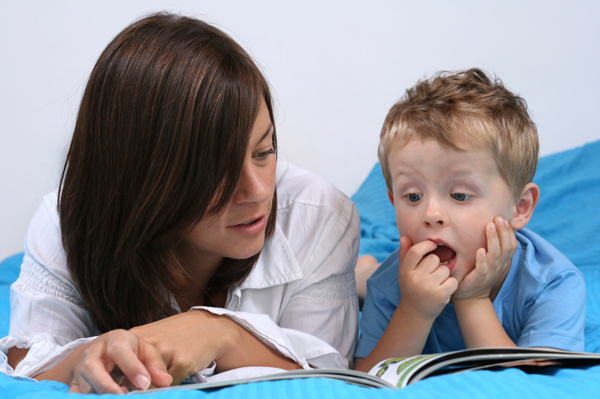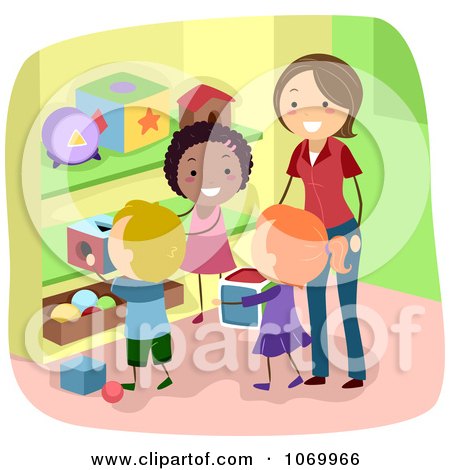When a new baby is born, it's natural for a child who was an only child or the baby of the family up until the baby was born to feel jealous. A child may think to himself, weren't things good enough without the new baby? Teaching your child how to deal with their feelings through validation and patience, can help make the adjustment easier for them to handle.
Prepare Your Child For The New Baby:
 Reading stories about a new sibling - and the emotions that come along with it - can help your child understand what having a new sibling might be like. Showing them pictures of when they were born, as you talk to them about how they were as a baby, gives them a perspective of the stages the new baby might go through. Having a present ready for your older child 'from the baby,' can give him/her positive feelings toward the baby from the start.
Reading stories about a new sibling - and the emotions that come along with it - can help your child understand what having a new sibling might be like. Showing them pictures of when they were born, as you talk to them about how they were as a baby, gives them a perspective of the stages the new baby might go through. Having a present ready for your older child 'from the baby,' can give him/her positive feelings toward the baby from the start. Dealing With Jealous Feelings:
- Assuring your child that they are unique and there will never be anyone exactly like them and you will always love them unconditionally, could help them feel less jealous about your love for the new baby.
- Instead of blaming things that don’t work out on the baby, you can re-frame the situation in a way that shows your child you are considering his/her needs. For example, instead of saying, "I can’t play with you because I am changing the baby’s diaper", you can say "my hands are busy but they will be free in a few minutes.” Instead of saying "We can’t go out because the baby needs to be home,” you might say something like "As soon as Daddy gets home, we can go out.”
- Mentioning your older child to your baby can make him/her feel you care. For example, at a time when your baby feels content to lie by him/herself say out loud so your child can hear you: "Mommy is putting you down now because I need to spend some time with your older brother now."
- Having a special box where you put toys, activities, and even treats for the sibling to open up and enjoy during times when the baby needs to be fed can help him/her feel included. Brother/Sister can even help to make or decorate the box so he or she will feel a sense of pride and ownership within the situation; this will help contribute to him or her feeling a sense of security during an otherwise unsettling time!
In general, including your child in activities that involve the baby whenever possible can help your child feel involved and less likely to start acting out.
Teach Instead Of Punish:
 When your child tries to hit the baby, telling him/her the behavior you do want, instead of emphasizing what you don’t is more effective. For example, instead of saying "stop hitting," you might say "Gentle,” as you gently take their hand and stroke it over the baby. Instead of putting your toddler in time out when they act out, you can teach them how to express their feelings in a more positive way. For example, if a toddler throws something at the baby because he wants attention, the child can be told; “when you want Mommy to be with you, use words like; "Mommy, can you be with me now?" Or 'I feel sad.' Even if your child is very young and doesn’t have the vocabulary, they can communicate this on their level by learning to say "I want you Mommy," instead of hurting the baby. If a child tries to hurt the baby often, it might be a better idea to keep them separated while you give the older child lots of attention whenever possible. As your child learns that you still love him and his feelings are validated, he will learn to love his new sibling and will grow out of this stage.
When your child tries to hit the baby, telling him/her the behavior you do want, instead of emphasizing what you don’t is more effective. For example, instead of saying "stop hitting," you might say "Gentle,” as you gently take their hand and stroke it over the baby. Instead of putting your toddler in time out when they act out, you can teach them how to express their feelings in a more positive way. For example, if a toddler throws something at the baby because he wants attention, the child can be told; “when you want Mommy to be with you, use words like; "Mommy, can you be with me now?" Or 'I feel sad.' Even if your child is very young and doesn’t have the vocabulary, they can communicate this on their level by learning to say "I want you Mommy," instead of hurting the baby. If a child tries to hurt the baby often, it might be a better idea to keep them separated while you give the older child lots of attention whenever possible. As your child learns that you still love him and his feelings are validated, he will learn to love his new sibling and will grow out of this stage.Make Special Time Just For Your Older Child:
 Making time to be just with your older child reminds them that they are special too. One-on-One time helps children feel reassured that they are important and loved, regardless of the love you show to other siblings. It can be fifteen minutes of reading stories together, or a trip to the grocery store where only one child comes along. Even just sitting and talking without being preoccupied with other things makes a child feel you care! For parents who are extra busy, marking a date on the calender to go somewhere or do an activity your child enjoys, can help make that time happen.
Making time to be just with your older child reminds them that they are special too. One-on-One time helps children feel reassured that they are important and loved, regardless of the love you show to other siblings. It can be fifteen minutes of reading stories together, or a trip to the grocery store where only one child comes along. Even just sitting and talking without being preoccupied with other things makes a child feel you care! For parents who are extra busy, marking a date on the calender to go somewhere or do an activity your child enjoys, can help make that time happen.



